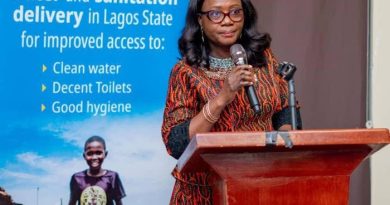LASG committed to building future farmers through Agric-scholars programme
The Lagos State Government has restated its commitment to grooming the next generation of farmers through the Lagos Agricultural Scholars Programme (LASP) – an initiative designed to introduce secondary school students to practical agriculture while building sustainable pathways for food security.
The Honourable Commissioner for Agriculture and Food Systems, Ms. Abisola Olusanya, revealed this during the commissioning of projects implemented under the Lagos Agricultural Scholars Programme at Ansar-ur-Deen Grammar School, Surulere; CMS Grammar School, Bariga; Holy Child College, Ikoyi; and Vetland Senior Grammar School, Agege, respectively.
She emphasised that empowering young people with agricultural skills is a strategic investment, saying the Lagos Agric Scholars Programme is an evolution of the Ministry’s long-standing programme, which has for years taken agriculture into schools across Lagos by setting up school farms in partnership with the Ministry.
She explained that while the initiative exposed students to farming, there was a need to modernise and reposition the programme in line with emerging realities.
The Honourable Commissioner noted that there has been a general apathy among young people towards agriculture, with more youths aspiring to careers in football, entertainment, or technology-related fields such as fintech, rather than in food and agricultural systems.
She said the Agric Scholars Programme was designed to address this gap by integrating technology into food production, processing, and marketing.
She highlighted that the programme encompasses critical agricultural value chains, including aquaculture, horticulture, and poultry, supported by a reticulated system that demonstrates practical, sustainable farming methods.
“Behind us today, you can see one such system where waste from aquaculture is used to irrigate plants, while organic waste is converted into inputs for open-field cultivation. “This creates a circular model that shows students how technology and sustainability can transform food systems,” the Commissioner explained.
She further emphasised that exposing students to live demonstrations of modern farming technologies within their schools will change their attitudes and inspire them to view agriculture differently.

In her words, “By seeing, practising, and being part of these systems, we hope to encourage more young people to aspire to become key players in Lagos’ food systems of the future.”
She underscored the importance of supporting the food system space, pointing out that agriculture offers immense rewards, from profits and business opportunities to the more profound impact of feeding society and ensuring food availability at the right price and in the right places. She stressed that children, senior citizens, and every member of the community benefit when the agricultural sector thrives.
While speaking on the ongoing registration of farmers in Lagos State under the “Produce for Lagos Programme”, the Honourable Commissioner explained that the programme, which ties into the ₦500 billion Offtake Guarantee Fund, is designed to harmonise data on farmers and categorise them by value chain, scale, and specialisation. Such a system will ensure that farmers are strategically positioned within the state’s agricultural framework, making it easier to channel support, resources, and opportunities where they are most needed.
She revealed that registration is currently taking place via the website: www.produceforlagos.com, which is open not only to farmers in Lagos and across Nigeria, but also to service providers within the agricultural value chain.
She assured that as the programme unfolds, all stakeholders would have a role to play in strengthening food production and distribution in Lagos State.
Also speaking, the Permanent Secretary, Ministry of Agriculture and Food Systems, Mr. Emmanuel Audu, described the School Agric Programme as a visionary effort aimed at grooming the next generation of farmers in Lagos State.
He noted that the initiative bridges the gap between classroom theory and practical application, allowing students to see agriculture as a business and a viable path to self-reliance.
Mr. Audu commended the schools for the impressive way they have maintained the facilities provided under the programme, stressing that such commitment demonstrates the readiness of both teachers and students to embrace agriculture as part of their everyday learning.
He further highlighted the Ministry’s determination to scale the project to all secondary schools across the state, both public and private. According to him, this expansion will make agriculture a permanent part of the education system in Lagos, helping to nurture students who will not only contribute to food production but also see agriculture as a platform for innovation and entrepreneurship.
He expressed optimism that with the introduction of modern technology into agricultural training, young people will find the sector more attractive. He affirmed that this approach will equip them with the skills to thrive in agribusiness, strengthen food security, and support the growth of Lagos State’s food system.
The Principals and School Administrators, accompanied by Agricultural Science Teachers and students, led the HC and the PS on a tour of the school farms, showcasing how the facilities are supporting agricultural projects and enhancing the students’ practical skills in farming.
The management of the beneficiary schools thanked the Lagos State Government for the laudable initiative, saying it has increased the agricultural skills of the students.




